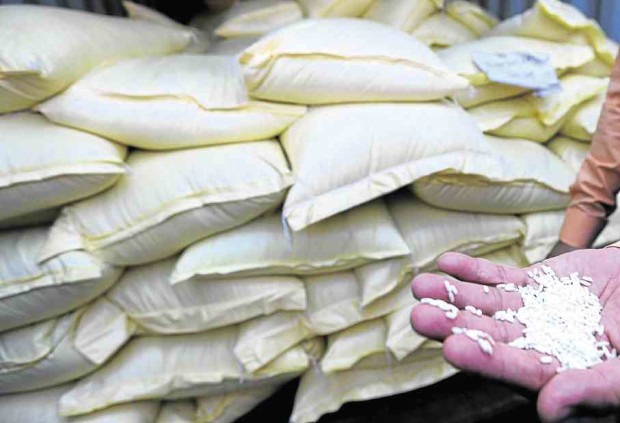President Rodrigo Duterte’s directive for the National Food Authority (NFA) to boost rice supply from local farms before considering importation could unduly drive up consumer prices, New York-based think tank Global Source said.
In a commentary titled “Inflation risk from rice policy?” by economists Romeo L. Bernardo and Marie-Christine Tang, Global Source said the policy could lead to the depletion of NFA’s inventory, driving up local prices.
“The struggle that led to the President insisting on the NFA buying local rice risks the country’s rice stocks falling further [especially if domestic farm outputs fall short of expectations] and thus, domestic rice prices spiking,” Global Source said.
Global Source was referring to the conflict between majority of the NFA Council—the agency’s governing body comprised of NFA officials and economic managers from various departments—and NFA administrator Jason Laureano Aquino.
The majority, led by the council’s chair, Cabinet Secretary Leoncio Evasco Jr., wanted the NFA to continue accommodating inbound shipments through private-sector importation. Aquino had disagreed, pushing for government importation through the NFA itself.
Inflation trend to persist
The conflict led to the dismissal of Cabinet Undersecretary Maia Chiara Halmen Valdez, who represented Evasco in council meetings.
“Rice accounts for close to 9 percent of the CPI (consumer price index) basket and given the projected inflation path, double-digit increases during the lean months would push the headline inflation rate well over the upper end of the BSP’s (Bangko Sentral ng Pilipinas) inflation target band,” it said.
The BSP is bent on limiting average inflation this year within the range of 2 percent and 4 percent.
“Many economic watchers have raised concerns about recent increases in consumer prices. From below 2 percent in the 16 months to August 2016, the headline inflation rate climbed past 3 percent in February and March 2017,” Global Source said.
The think tank added that the BSP now expects the uptrend to continue through the third quarter, driving the figure “very close” to the upper end of the target range.
Global Source said the government’s latest rice policy is “an emergent risk that could ‘shock’ inflation forecasts.”
While both factions in the NFA Council bickered over how to import and beef up its stock, Global Source noted that inventory as of March was good for 12 days’ consumption only.
Importation to ease worries
The NFA is required by law to maintain a minimum stock good for 15 days for most of the year, but it must have at least 30 days’ supply during the lean months from July to September.
The country’s main crop is planted and grown during the third quarter, and harvest does not start until October.
Meanwhile, Aquino the NFA administrator said last Tuesday the agency was currently unable to buy palay as farm-gate prices averaged at P18.60 per kilo as of the last week of March, higher than the NFA’s price cap of P17 a kilo.
“With rice prices starting to inch up recently and import lags of anywhere from one to four months, a decision to allow importation would help allay fears of impending shortages that could lead to higher price increases in anticipation of the demand/supply gap,” Global Source said.
“To avoid delays in light of the internal NFA disagreement and ensure that a decision to import is quickly carried out, the President might as well decide also whether NFA itself should import or allow private traders to do it,” the group added.
